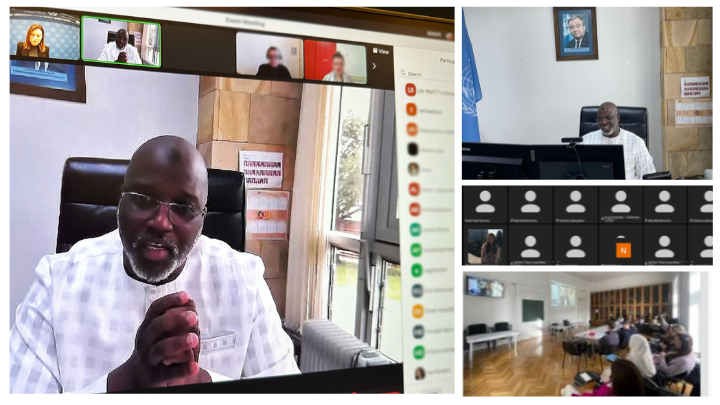Registrar Abubacarr M. Tambadou inaugurates the second semester of the Mechanism’s Inter-University Video Lecture Programme

The Registrar of the International Residual Mechanism for Criminal Tribunals (Mechanism), Mr. Abubacarr M. Tambadou, today opened the second semester of the fifth cycle of the Inter-University Video Lecture Programme (Programme), titled “International Law and Facts Established before the International Criminal Tribunal for the former Yugoslavia (ICTY)”. Registrar Tambadou delivered a lecture on the role and functions of the Mechanism for law students from 14 law faculties and one faculty of political sciences from across the region of the former Yugoslavia.
During the session, Registrar Tambadou provided students with a comprehensive historical overview of the Mechanism's establishment, delving into its specific roles and functions. He also highlighted the challenges faced by the Mechanism as it took over essential functions previously performed by the International Criminal Tribunal for Rwanda (ICTR) and the ICTY. Drawing comparisons, Registrar discussed both the similarities and key differences between the mandates of the Mechanism and its two predecessor Tribunals. The engagement continued with a question-and-answer session, and the Registrar concluded with key messages of hope and responsibility of young people to also preserve the contributions and legacy of international justice mechanisms.
Today’s lecture was the ninth in the fifth cycle of the Programme, which launched in October 2023 with a lecture by the Mechanism’s President, Judge Graciela Gatti Santana. Students also received lectures by experienced lawyers from the Mechanism’s Office of the President, Chambers, the Office of the Prosecutor, as well as by a member of the Defence, covering such topics as the destruction of cultural heritage, joint criminal enterprise, prosecution of war-time sexual violence and the rights of the accused.
The Programme, developed and implemented by the Mechanism Information Programme for Affected Communities (MIP), brings together more than 120 postgraduate students from across the former Yugoslavia to initiate a dialogue about the region’s recent history, the role of the ICTY and the principles of international criminal law and international humanitarian law.
Together with the participating universities, the MIP has created a regional network of law faculties – the first of its kind – where law students from different countries in the Balkans region can learn about - and discuss - the work of the ICTY and its legacy. The lecture series not only builds the students’ knowledge, capacity and understanding of international criminal law and international humanitarian law, but also serves as a platform for genuine dialogue between law students from the countries of the former Yugoslavia.
The network includes faculties of the Union University in Belgrade, the University of Donja Gorica, the University of Niš, the Haxhi Zeka University of Peja, the University of Podgorica, the University of Pristina, the University of Rijeka, the University of Sarajevo (Faculty of Law and Faculty of Political Sciences), Ss. Cyril and Methodius University of Skopje, the University of Split, the University of Tuzla, the University of Vitez, the University of Zagreb, and the University of Zenica.